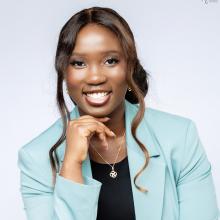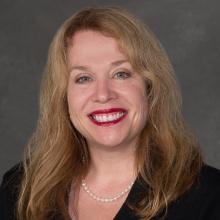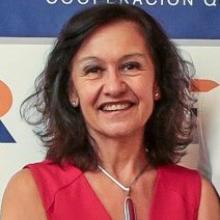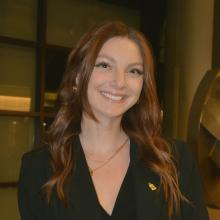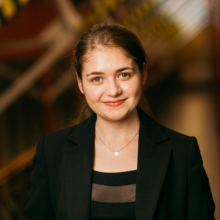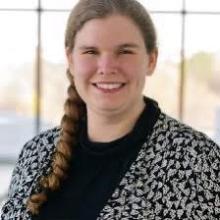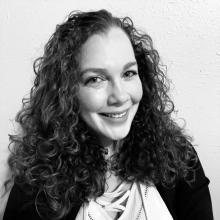Eight Women, Eight Life-Changing Experiences
Their experiences stretch across decades. Some went to different countries. Others came to the United States and studied different disciplines in different parts of the country. Yet for eight women, their experiences as international students or as U.S. students studying abroad share a common theme: a deep impact on their perspective of the world around them—and their own worlds. Whether their global education experience took place just last year or decades ago, the impact has reverberated in their lives and shaped their career paths. Here are their stories.
Sedinam Worlanyo
- Home country: Ghana
- Institutions: Swarthmore College, BA, computer science and economics; Stanford University, MS, learning, design, and technology
- Current position: Senior user experience researcher, Coursera
Sedinam Worlanyo arrived on the Swarthmore campus in 2013 ready to study. What she wasn’t ready for was winter in Pennsylvania, having previously never set foot on the college’s campus.
“I brought a coat that was not doing the job, and the manager of international studies walked me to Macy’s for my first winter coat,” she recalls with a laugh.
For Worlanyo, preparing to study in the United States as an international student had many layers. “If you peel off one layer, it was exciting to meet people with different cultures and backgrounds,” she says. The second layer was the realization that leaving home meant missing out on family experiences, like a cousin’s wedding.
The final layer was knowing what she had to offer. “I was coming in knowing that I was contributing from my unique experiences in Ghana,” Worlanyo says.
Worlanyo long knew she wanted to study outside of Ghana. “There was a level of wanting to expand my opportunities, a level of learning you do when you’re exposed to different cultures,” she says.
At Swarthmore, she found her confidence and independence. “It helped me learn who I was as a person,” says Worlanyo. One of her roles was to help other international students as a tour guide on campus.
“There was a level of wanting to expand my opportunities, a level of learning you do when you’re exposed to different cultures.” —Sedinam Worlanyo
Her time at Swarthmore also changed her career path. Originally interested in political science, Worlanyo instead decided to pursue computer science, eventually earning a master’s degree from Stanford. There, she adapted her Swarthmore tour guide experience.
“I was intentionally seeking out people to show people that Stanford can be accepting to people of different backgrounds,” she says.
Even though she has completed her education, Worlanyo is still helping other international students. Remembering her days spending the winter holidays by herself, far from home, Worlanyo now hosts an event during that time for international students in the Bay Area. “It’s bringing people together to connect to other people who aren’t going home,” she says.
In her current role at Coursera, Worlanyo says her experience as an international student still comes in handy. “I have a unique position because of how I see the world,” she says. “Working in the corporate world I see things that others might not necessarily see.”
That vision includes expanding educational opportunities for Africans. One of Worlanyo’s current projects is championing an initiative called Coursera for Africa. “I’m making sure our mission for promoting access to education worldwide reaches the entire continent,” she says.
Jill Blondin
- Home state: Indiana
- Institution: Indiana University, BA, art history; University of Illinois Urbana-Champaign, PhD, art history
- Study abroad: Paris, 1994; Vienna, 1997
- Current position: Associate vice provost for global initiatives, Virginia Commonwealth University
In her role at Virginia Commonwealth University, Jill Blondin is responsible for the school’s living-learning international initiatives. So, it’s no surprise that she’s a huge supporter of study abroad programs. What might be surprising is that she attributes her career entirely to her own study abroad experience.
“My study abroad experience is 100 percent the reason I’m doing what I’m doing,” says Blondin. “I can’t even imagine what my career would have been without study abroad. I’m the poster child for it.”
As a “not even first generation” college student, Blondin found study abroad a foreign idea in more ways than one as an undergraduate. She recalls being excited for a friend who had the chance to study abroad. “I thought, ‘I wish I could do that.’ As an undergraduate, the furthest I could dream was [Washington,] D.C.”
Nor did her academic advisers suggest study abroad as an option, in part because her degree coursework was focused on U.S. art. It wasn’t until she was in graduate school, in her first year of her master’s program, that she decided to do a faculty-led summer program in Paris.
The experience changed the direction of Blondin’s career.
“I can’t even imagine what my career would have been without study abroad. I’m the poster child for it.” —Jill Blondin
“It was so immediately transformative that I remember thinking that if I ever became a professor, I would make sure that I would provide the same opportunity for students,” she recalls now.
Indeed, when Blondin got a teaching job at the University of Texas-Tyler, that was one of her priorities. “As soon as I arrived, I put together a short-term study abroad program for students,” she says. What started out as a faculty-led program in 2005 eventually developed into a wide range of programs in different countries. Her passion and organizational ability ultimately led her into administration.
Besides the personal and professional development that study abroad offers students, Blondin hopes her colleagues in international offices remember to capture the excitement of the experience as well.
“As much as the educator in me wants to talk about the pedagogy, we need to share the joy of studying abroad,” she says. “It’s really fun, and that’s not mutually exclusive to learning.”
Norma Gonzalez
- Home country: Argentina
- Institution: Fulbright scholar, University of Massachusetts-Amherst, MA and PhD, U.S. diplomatic history
- Retired executive director, Fulbright Commission Argentina
By the time Norma Gonzalez retired after 30 years as head of the Fulbright Program in Argentina, she had helped 6,000 students have an international education experience. “I thought I was the only person that Fulbright changed their life, but I felt it over and over again from all the grantees,” she says with pride.
Gonzalez was teaching in a small town in Córdoba province when she was granted a Fulbright scholarship in 1986. “I really wanted to study abroad,” she says. “It wasn’t really common for people to study abroad in those days.” Complicating the decision was the fact that Gonzalez was bringing her 10-year-old son with her.
Gonzalez was worried when she entered the program at the University of Massachusetts-Amherst because, while she was well read in U.S. history, she hadn’t formally studied it. Instead, she had studied English. “I was worried about writing papers, but my English was much better than American students’ [English].”
The start of Gonzalez’s stay was bumpy. She rented an apartment only to discover that it wasn’t in the Amherst school district for her son. She had assumed the apartment would be furnished, but furnished housing wasn’t common in Amherst.
Eventually things sorted themselves out. Her son adapted quickly, and, thanks to a professor’s connections, Gonzalez found herself accompanying the Argentine president at a meeting with President Ronald Reagan.
“I thought I was the only person that Fulbright changed their life, but I felt it over and over again from all the grantees.” —Norma Gonzalez
The return to Argentina was a different adjustment. “It’s much harder to come home because you have changed,” she says.
After a year, Gonzalez heard that the Fulbright office in Argentina was looking for an executive director. “I thought there was no way they would choose me,” she says. “I wanted to apply for a secondary position.” Instead, she was encouraged to apply for the top job—which she landed and held until last year.
Compared with her time in Amherst, when studying outside of Argentina was not as common, Gonzalez says now it is almost mandatory. “In these days, everyone has to have an international experience,” she says. “You need to leave your country. It opens your mind; it gives you things you just can’t produce in a classroom.”
Yet, for all the many students Gonzalez has helped study in another country, her proudest achievement is her son, Pablo, who is now a physician residing with his family in Indiana. “This is my greatest contribution to building bridges,” she says, “my son and my grandchildren.”
Aubrey Boswell
- Home state: Iowa
- Institution: Illinois State University, BS, marketing (May 2025)
- Study abroad: Cyprus, 2023
Aubrey Boswell had only ever been to a resort in Mexico before she decided she wanted to study abroad in the spring of 2023. “I grew up in such a small town that the majority of people never left the state, let alone the country,” she says. But instead of picking a popular destination to study, Boswell choose someplace much different: Cyprus.
“Getting out and seeing the world was one of the biggest things for me,” she says. (Cyprus’s beaches were a bonus.)
While usually two or three students from Illinois State attend the program at University of Nicosia in Cyprus each semester, Boswell was the lone student from her campus when she went. “I was literally all alone when I showed up,” she says. Fortunately, the program kept students busy with a packed schedule, so “you didn’t even have time to think about being so far away from home.”
Experiencing Cypriot culture gave Boswell a different perspective on U.S. culture. “You work to live, not live to work,” she says. She was amazed at the coffee shop culture of the island nation, where friends and family would meet for hours on end. “It’s so fascinating to see how other people work and think about things,” says Boswell. “I like their perspective on the work-life balance.”
“I tell other students about my experience and help them start their journey. Learning through people’s stories is how you make that connection.” —Aubrey Boswell
The experience taught Boswell self-sufficiency. “You’re in a foreign country, and it’s sink or swim,” she says. It also has made Boswell want to focus on international business in her career.
In the meantime, she is serving as a student ambassador for the education abroad office at Illinois State. Her hope is that her story will inspire other students to take the same leap she did. “I tell other students about my experience and help them start their journey,” Boswell says. “Learning through people’s stories is how you make that connection.”
Kate Shapovalenko
- Home country: Ukraine
- Institution: Harvard University; Carnegie Mellon University, MS, professional in project management (PPM), data analytics (May 2024)
Kate Shapovalenko has had two different experiences as an international student—differences made even more drastic because of world events. In 2017, as a third-year student at her university in Ukraine, she attended Harvard University for one semester.
“It was my first-ever experience being abroad,” she says. “The main thing I was mostly concerned about was the language barrier.” She listened to podcasts and other broadcasts in English to sharpen her language skills in preparation for her time in the United States.
Shapovalenko returned to Ukraine, but that one semester changed her. “After my first experience, I had all these ideas I could share,” she says.
After graduating from college, she began working for the Ukrainian government. But she yearned for more. “The coolest research papers are developed by American professors,” says Shapovalenko. “Sometimes there’s a gap between when ideas are generated and when they are spread around the world.” She wanted to be at the cutting edge of the knowledge.
“This international experience shows me how diverse the world is and how to embrace it.” —Kate Shapovalenko
After two deferrals, Shapovalenko came to study data analytics at Carnegie Mellon in February 2022. Later that month, Russia attacked Ukraine.
“I got here in February, and I had a ticket to go back in April,” she says. “I’m still deciding what to do.”
Despite the current situation in her home country, her experience at Carnegie Mellon has been positive, both inside the classroom and outside. “I’ve had a chance to experience the way people think,” she explains. “It gave me so much understanding and new perspective.”
Shapovalenko credits her college for highlighting diversity among international students. “My department does a different cultural event every year,” she says. “It’s so great to see and talk about different, diverse experiences.”
That breadth of perspective has carried over into her work. “Even now when I’m working, I try to influence as many people as possible to get as many perspectives as I can,” she says. “This international experience shows me how diverse the world is and how to embrace it.”
Lindsey Pamlanye
- Home state: New York
- Institution: Manhattan College, BA, secondary teaching and education; BA, English
- Study abroad: University of Dublin, MS, equality studies
- Current position: Program coordinator, Mobility International USA
Throughout her undergraduate career, Lindsey Pamlanye was convinced that she could never study abroad. Pamlanye has hydrocephalus, a neurological condition caused by an abnormal buildup of fluid deep in the brain. While her health is often stable for years, when something does go wrong, it can go wrong quickly.
“It’s quite unpredictable,” she notes. “The only intervention is a device that comes through brain surgery.”
It was a chance encounter in a Bronx pub after she had graduated college that made her realize that she could study abroad. She was chatting with someone from Ireland and mentioned how much she had always wanted to spend time there, but her medical condition had held her back. He responded dryly, “Oh, well, in Ireland, it’s not like we have hospitals.”
That sly remark made her stop and think. “You get stuck in all the things you can’t do,” she says. She consulted with her doctor, who quickly gave her the OK to study abroad.
As it turns out, studying abroad in Ireland was the perfect solution for Pamlanye, who needed a master’s degree for her teacher’s certification. Besides good medical care, Dublin had multiple direct flights to New York City, so her parents could quickly travel to her in the event of a medical emergency. (Pamlanye did end up having emergency surgery while in Ireland.)
“Students need to understand the opportunities that are available to them. It’s not about being nice; it’s about doing what’s necessary. That’s the floor. The floor is being inclusive.” —Lindsey Pamlanye
When she arrived in Dublin in 2018, Pamlanye discovered firsthand that being a disabled student studying abroad was hard work. “It became a full-time job,” she says. She spent time establishing relationships with the local hydrocephalus community so she knew what resources would be available to her.
The work that she put into being able to pursue the study opportunity in Ireland changed her focus from service learning in the classroom to the barriers facing international students studying in Ireland. “It turned into my master’s thesis,” says Pamlanye.
Pamlanye says that her experience has made her realize that study abroad programs need to be more inclusive in addressing the needs of disabled students.
“Students need to understand the opportunities that are available to them,” she says. Helping disabled students isn’t a question of going the extra mile. “It’s not about being nice; it’s about doing what’s necessary. That’s the floor. The floor is being inclusive.”
Arpita Upadhyaya
- Home country: India
- Institution: University of Notre Dame, PhD, physics
- Current position: Professor of physics, University of Maryland
Arpita Upadhyaya always knew she needed to study in the United States.
“My heart was always in basic science,” she says. “I already knew at that time, if you want to study the basic sciences, you needed to go to the United States, because that’s where the opportunities were.”
In 1994, when she was looking to apply for a graduate program, she didn’t have the internet to turn to for research, relying instead upon books and guides. She applied to Notre Dame and was awarded a teaching assistant position.
Despite the magnitude of the move, Upadhyaya wasn’t worried. “I was thinking [about] why I was not more concerned. You don’t think about the problems when you’re young,” says Upadhyaya. “You think about the excitement of the new opportunity.” It helped that colleagues from her college in India had already followed the same path.
Still, Upadhyaya admits, “That first year was pretty challenging. Many times, I was thinking, ‘Why am I doing this?’”
“Having groups of international scholars in the United States has the potential to provide different knowledge and an overall global networking opportunity. They are providing valuable contributions and exceptional value.” —Arpita Upadhyaya
Upadhyaya didn’t get housing on campus, and she had to navigate limited transit options, which sometimes left her uncomfortable. Upadhyaya feels that the international office could have been more aware of how vulnerable she was as a female international student and provided more support.
Yet, Upadhyaya stresses, “Overall, the time was amazing.” She was able to work on cutting-edge science in the field of biological physics. While she considered a return to India, she and her husband—whom she met in the doctoral program—decided to settle in the United States, in large part because she felt the research in the United States was so exciting.
For today’s international students, Upadhyaya is worried about the barriers to studying in the United States, especially for graduate students. “One of the hardest problems for international students is the uncertainty of the visa,” says Upadhyaya. “It’s important to have a sense of certainty during their time here.”
She hopes that policymakers will recognize the benefits of international education. “Having international students come to the country is highly valuable to both sides,” Upadhyaya says. “Of course, it’s valuable to the students because they’re getting an education. But having groups of international scholars in the United States has the potential to provide different knowledge and an overall global networking opportunity. They are providing valuable contributions and exceptional value.”
Shawna Uhl
- Home state: Texas
- Institution: Texas A&M University, BS, architecture
- Study abroad: Wales, 2020; Barcelona, 2023
- Current role: Master’s program in architecture, Texas A&M; assistant at Veteran Resource and Support Center, Texas A&M
When Shawna Uhl enlisted in the Navy in 2014, she thought she would get to see the world. That plan took a turn when, due to an injury, she remained stateside during her service.
Yet, a military career paved a different way for her to experience the world. After leaving the Navy, Uhl pursued higher education. Thanks to her veteran status, U.S. Department of Veteran Affairs (VA) benefits have covered many of her study abroad costs. As a result, she has had two study abroad experiences: one in Wales as an undergraduate, and another in Barcelona as part of her graduate program.
“It’s such an incredible immersion into global culture,” Uhl says. “Being able to not be so confined to your own little life is a big thing for me and to have that opportunity overseas while also getting an education is pretty incredible.”
Uhl’s first study abroad experience, in Wales, took place at the start of the pandemic. “It was great until COVID-19 happened, and then everything was online,” Uhl says, robbing her of the full study abroad experience. However, since Texas A&M did not require students to return to the United States at the start of the pandemic, she remained in Wales until June 2020.
Her experience in Barcelona in spring 2023 was very different from her time in Wales. In addition to taking architectural courses, Uhl was a graduate teaching assistant for the third-year undergraduate architecture students.
“It was nice to learn the courses in architecture from a foreign perspective,” says Uhl. But the learning wasn’t confined to the classroom. Walking around Barcelona, Uhl could appreciate the innovative work of famous Spanish architect Antoni Gaudi in person.
“Being able to not be so confined to your own little life is a big thing for me and to have that opportunity overseas while also getting an education is pretty incredible.” —Shawna Uhl
“Barcelona has such an interesting style because Gaudi has such an incredible twist on architecture,” she says. “Being able to see his work up close is so cool.”
“I loved the walkability of the cities there,” says Uhl. “That was something that was so new to me.” Returning to Texas has been an adjustment, she says. “I’m realizing I just can’t walk everywhere.”
Uhl knows that cost can present a barrier to some students considering studying abroad. “I’ve been very fortunate with the VA covering it,” she notes. “But I would 100 percent recommend that everybody have such an experience at least once in their school careers.” •
About International Educator
International Educator is NAFSA’s flagship publication and has been published continually since 1990. As a record of the association and the field of international education, IE includes articles on a variety of topics, trends, and issues facing NAFSA members and their work.
From in-depth features to interviews with thought leaders and columns tailored to NAFSA’s knowledge communities, IE provides must-read context and analysis to those working around the globe to advance international education and exchange.
About NAFSA
NAFSA: Association of International Educators is the world's largest nonprofit association dedicated to international education and exchange. NAFSA serves the needs of more than 10,000 members and international educators worldwide at more than 3,500 institutions, in over 150 countries.
NAFSA membership provides you with unmatched access to best-in-class programs, critical updates, and resources to professionalize your practice. Members gain unrivaled opportunities to partner with experienced international education leaders.


